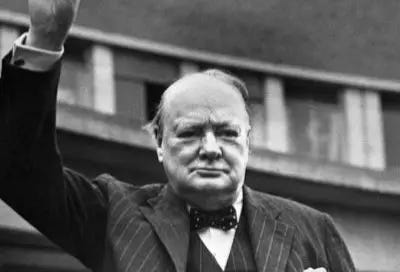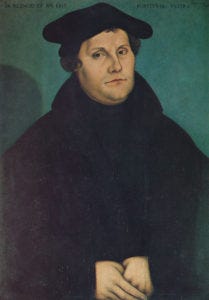When Only Courage Will Do
By Robin Currie
“Here I stand. I can do no other.”
When he proclaimed those words at the imperial Diet convened in the city of Worms in April 1521, Martin Luther must have fully understood what was on the line. If he needed reminding he only had to look across at his accusers. Gathered in front of him were the supreme powers of the day, temporal and spiritual: the representatives of “His Imperial Majesty,” Holy Roman Emperor Charles V and the representatives of “Christ’s vicar on earth,” Pope Leo X.
For Luther it was a moment of truth (as he saw it, a truth that could set men free). This is where the former monk had to make his stand or choose to walk away.
"Here I Stand." Martin Luther in 1529, painted by Lucas Cranach the Elder. Image Credit: Deutsches Historisches Museum/Wikimedia Commons
Luther’s convictions about the Scriptures had angered both emperor and pope—and as he knew, this could have deadly consequences. A century earlier one of Luther’s inspirations, the Bohemian reformer Jan Hus, had been condemned as a heretic. For his beliefs and the perceived threat they posed to the established order, Hus had been burned at the stake.
In Worms, Luther knew walking away was an option. All he had to do was “take it all back”—or as his accusers put it, recant. The temptation to do so must have been almost overwhelming. For as far as Luther was concerned, the stakes (forgive the pun) were clear: By rejecting a return to the status quo, he faced a future life of constant uncertainty and danger, and possibly no life at all.
Luther decided to stand and not walk—and changed the world as a result. Americans today are rarely called upon to exhibit similar acts of courage, but such courage is needed to preserve what is right with our country and fight against what is wrong.
What It Takes
Since our country’s founding, change has come about through acts of courage. At key points in history, Americans have had to take a stand—from the Minutemen who answered the call at Lexington and Concord to the civil rights protesters who stood up by sitting down, be it at a lunch counter in Greensboro or on a bus in Montgomery.
Courage in these instances required a willingness to confront the powerful, just as it has elsewhere in the world. Think of the unknown young man who blocked the path of an oncoming column of tanks in Tiananmen Square on June 5, 1989. His act highlights an essential aspect of courage—risk and, in his case, fear.
But courage is not simply a matter of daring or boldness; it also requires “good action.” The philosopher Philippa Foot poses the question of whether a fearless murderer exhibits courage—and quickly answers no. As she puts it, courage is not just mastering fear but doing so in the pursuit of good ends. In such circumstances the mastery may be considered a necessary but not sufficient condition.
Use Your Words
Of course, physical bravery is just one manifestation of courage. You can “stand up” by using words too. Think of Ruth Bader Ginsburg and “I dissent.” Or of Edward R. Murrow’s reminder that “we are not descended from fearful men—not from men who feared to write, to speak, to associate, and to defend causes that were, for the moment, unpopular.” Or the exhortation of Friedrich Hayek for us to “make the building of a free society once more an intellectual adventure, a deed of courage.”
Winston Churchill well understood the importance of words—and the courage needed to deliver them. “Courage is rightly esteemed the first of human qualities,” he is said to have declared, “because it is the quality which guarantees all others.”
Churchill’s physical courage was beyond question, whether fighting on the Northwest Frontier, escaping from a Boer prisoner-of-war camp, or trying to get aboard one of the vessels headed for the Normandy landings. But during his “wilderness years” in the 1930s, he required courage of a different sort. Few members of Parliament at that time wanted to hear about the dangers posed by a resurgent Germany under Adolf Hitler. Churchill’s was a lone voice—and one that would not be silenced.
In a free and open society, we all have opportunities to “use our words.” This has never been easier than in the era of social media, which allows us to do so with anonymity and impunity. Given the levels of risk involved, this generally requires as little courage from social media users as from the “cold and timid souls” who take their seats around the arena rather than standing in it.
Most often we think of courage in terms of standing up to powerful opponents—Redcoats, segregationists, the People’s Liberation Army, the majority on the U.S. Supreme Court or the Wehrmacht. But it can also require taking on your own “tribe.”
Journalist Eoghan Harris calls this engaging in acts of good authority, which involves putting yourself in your enemy’s shoes and leading your own followers away from their prejudices—in other words, refusing to pile on with the rest, challenging the comfortable consensus and breaking ranks to stand for what is right. In such instances, you’re not so much following the herd or going with the flow as striking out on your own and swimming upstream.
A Legacy of Courage
Most of us who live in the United States are the beneficiaries of past acts of courage—immigrant forebears who risked everything to get here. Leaving the familiar behind, they embarked on a journey that offered few guarantees and many unknowns. What it did offer was opportunity, the possibility for success that appeared unattainable in their countries of origin.
Impoverished as many of them were, the newcomers didn’t come empty-handed. What they offered their new home were the qualities they brought with them—not just determination and a willingness to work hard, but entrepreneurship and openness to innovation.
And other Americans are all the better for it. As Robert Krol points out, an estimated 7.25% of immigrants start new companies, compared with just 4.03% of natives. Looking at Fortune 500 companies, immigrants have started more successful businesses than have natives. And immigrants’ share of U.S. patents has increased significantly over the past 20 years. By contrast Krol says that, among the general U.S. population, the growth in entrepreneurship is slowing. Might courage be on a similar trajectory in this country too?
Height of the Mountain Versus the Flatness of the Land
In 1978, Soviet dissident Alexander Solzhenitsyn delivered a sobering warning during his Harvard University commencement address:
A decline in courage may be the most striking feature which an outside observer notices in the West in our days. The Western world has lost its civic courage, both as a whole and separately, in each country, in each government, in each political party. . . Must one point out that from ancient times a decline in courage has been considered the first symptom of the end?
Four decades later, instances of U.S. politicians acting with courage can be just as hard to find, but recently there have been a couple of high-profile contenders, like when a member of Congress (and of an American political dynasty) rebuts the claims of her former party leader and challenges GOP colleagues to move in a different direction. Or when a Democratic senator from West Virginia (dubbed the most powerful man in Washington) bucks his party on some of its signature proposals.
Solzjenitsyn arrives in the West in 1974. Image Credit: Dutch National Archives
Are these examples—of the powerful speaking out against others who are powerful—gutsy, principled, admirable? Or are they merely instances of political calculus and strategy? Perhaps a mixture of both. But considering the risks involved or the fear to overcome, do they rise to the courage of a Vercingetorix or a Boudicca, of a young Willie McBride or an even younger Malala Yousafzai? Clearly not.
‘Having Done All, To Stand’
Few of us may ever be called on to act with such “lay down your life” levels of courage. But depending on how you define it, most people can claim that on some occasion they stood up to “the establishment.”
But who and what represents the establishment in the United States today? Who controls the main centers of power and influence? This headline from a satirical newspaper about current-day protesters provides an amusing insight: “Man who agrees with the media, universities, corporations, and Hollywood thinks he's part of the Resistance.”
The headline ends with a term most often associated with Occupied France during World War II. Those French men and women who fought against the Nazis had a much more profound understanding of what was implied by the word “Resistance” and what it took to be part of it than some Americans who use it so casually today.
If It’s Good Enough for Justice Ginsburg . . .
In the end, courage may come down to standing alone. It may mean standing up for yourself, for those who can’t stand up for themselves, for a principle or an idea, for your country, against a bully, against your own tribe or against a wrong. And it may require doing so in the knowledge that apparent failure is the most likely result. So, while courage can change the world, the consequences for the courageous individual may render it a victory of character over self-regard, self-interest and self-preservation.
Sometimes courage may require an act of physical bravery; sometimes it may just be saying, “I object—I won’t go along with that.” But at some point more and more Americans, like Ruth Bader Ginsburg, may have to stand up to a new consensus and say, “I dissent too.”






